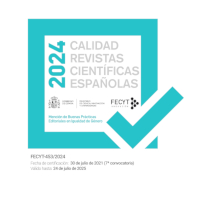La bibliofarmacia de Kate Chopin o la lectura como intoxicación
DOI:
https://doi.org/10.18172/cif.2180Abstract
One of the most important yet also most neglected sets of images in Kate Chopin's The Awakening (1899) is that of intoxication and poisoning. In the first half of this essay I trace and discuss all the noteworthy occurrences in the novel of such words as "narcotic", "intoxicant", "sting", "chloroform", "venom", and even "drug [store]", whose main referents in the plot are the reading of romantic novels and letters, listening to Frédéric Chopin"s music, out-of-wedlock eroticism, and the solitary contact with sublime forces such as the ocean. In the narrative, the main characters often approach their romantic experiences in either an allopathic or a homeopathic manner. In the second half of the essay I articulate a prophylactic economy of romantic experiences and emotions. To this end I resort to the ideas on the alternately healing and damaging effects of literature put forth by ennethBurke and Jorge Larrosa. I will then extrapolate one such economy from the situation of the characters in The Awakening to that of the undergraduate students in Spain who discover a novel with a self-destructive protagonist for the first time in an American literature course.Downloads
Download data is not yet available.
Downloads
Published
2013-07-15
How to Cite
Rodríguez García, José María. “La Bibliofarmacia De Kate Chopin O La Lectura Como intoxicación”. Cuadernos De Investigación Filológica, vol. 29, July 2013, pp. 7-28, doi:10.18172/cif.2180.
Issue
Section
Articles
License
The authors retain copyright of articles and authorize CIF the first publication. They are free to share and redistribute the article without obtaining permission from the publisher as long as they give appropriate credit to the editor and the journal.
Self-archiving is allowed too. In fact, it is recommendable to deposit a PDF version of the paper in academic and/or institutional repositories.
It is recommended to include the DOI number.
This journal is licensed under a Creative Commons Attribution 4.0 International License














